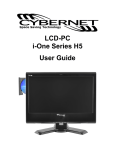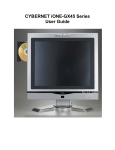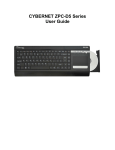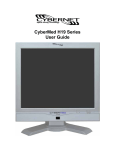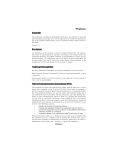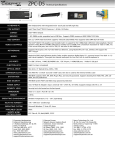Download Cybernet i-One 19 User guide
Transcript
CYBERNET iOne-G4 Series User Guide FCC-B Radio Frequency Interference Statement This equipment has been tested and found to comply with the limits for a class B digital device, pursuant to part 15 of the FCC rules. These limits are designed to provide reasonable protection against harmful interference in a residential installation. This equipment generates, uses and can radiate radio frequency energy and, if not installed and used in accordance with the instruction manual, may cause harmful interference to radio communications. However, there is no guarantee that interference will not occur in a particular installation. If this equipment does cause harmful interference to radio or television reception, which can be determined by turning the equipment off and on, the user is encouraged to try to correct the interference by one or more of the measures listed below. Reorient or relocate the receiving antenna. Increase the distance between the equipment and receiver. Connect the equipment into an outlet on a circuit different from that to which the receiver is connected. Consult the dealer or an experienced radio/television technician for help. Notice 1 The changes or modifications not expressly approved by the party responsible for compliance could void the user's authority to operate the equipment. Notice 2 Shielded interface cables and A.C. power cord, if any, must be used in order to comply with the emission limits. Trademarks All trademarks are the properties of their respective owners. Intel® and Pentium® are registered trademarks of Intel Corporation. PS/2 and OS®/2 are registered trademarks of International Business Machines Corporation. Windows® 7/Vista/XP/NT/2000/98/95 are registered trademarks of Microsoft Corporation. Netware® is a registered trademark of Novell, Inc. Award® is a registered trademark of Phoenix Technologies Ltd. AMI® is a registered trademark of American Megatrends Inc. i Safety Instructions 1. 2. 3. 4. 5. 6. 7. 8. 9. 10. 11. 12. 13. Always read the safety instructions carefully. Keep this equipment away from humidity. Lay this equipment on a reliable flat surface before setting it up. The openings on the enclosure are for air convection and hence protect the equipment from overheating. DO NOT COVER THE OPENINGS. Confirm the voltage of the power source and adjust accordingly to 110/220V before connecting the equipment to the power inlet. Place the power cord in such a way that it cannot be stepped on. Do not place anything over the power cord. Always unplug the power cord before inserting any add-on card or module. All cautions and warnings on the equipment should be noted. Never pour any liquid into the opening. This will cause damage and/or electrical shock. Do not disable the protective grounding pin from the plug. The equipment must be connected to a grounded main socket/outlet. The Optical Storage devices are classified as Class 1 Laser products. Use of controls or adjustments or performance of procedures other than those specified is prohibited. Do not touch the Laser lens inside the optical storage drive. If any of the following situations arise, have the equipment checked by authorized service personnel: The power cord or plug is damaged. Liquid has penetrated into the equipment. The equipment has been exposed to moisture. The equipment has not worked well or you cannot get it working according to the User's Guide. The equipment has been dropped and damaged. The equipment has obvious signs of breakage. DO NOT LEAVE THIS EQUIPMENT IN AN UNCONDITIONED ENVIRONMENT WITH A STORAGE TEMPERATURE ABOVE 50° C (122°F). IT MAY DAMAGE THE EQUIPMENT. CAUTION: There is danger of explosion if the battery is incorrectly replaced. Replace only with the same or equivalent type recommended by the manufacturer. WEEE Statement (Waste Electrical and Electronic Equipment) ii The WEEE directive places an obligation on EU-based manufacturers, distributors, retailers and importers to take-back electronics products at the end of their useful life. A sister directive, ROHS (Restriction of Hazardous Substances) complements the WEEE Directive by banning the presence of specific hazardous substances in the products at the design phase. The WEEE Directive covers products imported into the EU as of August 13, 2005. EU-based manufacturers, distributors, retailers and importers are obliged to finance the costs of recovery from municipal collection points, reuse, and recycling of specified percentages per the WEEE requirements. Instructions for disposal of WEEE by Users in the European Union The symbol shown below is on the product or on its packaging, which indicates that this product must not be disposed of with other waste. Instead, it is the user‟s responsibility to dispose of their waste equipment by handing it over to a designated collection point for the recycling of waste electrical and electronic equipment. The separate collection and recycling of your waste equipment at the time of disposal will help to conserve natural resources and ensure that it is recycled in a manner that protects human health and the environment. For more information about where you can drop off your waste equipment for recycling, please contact your local city office, your household waste disposal service or where you purchased the product. iii TABLE OF CONTENTS FCC-B Radio Frequency Interference Statement ........................................................ i Trademarks ..................................................................................................................... i Safety Instructions ........................................................................................................ ii WEEE Statement ........................................................................................................... ii Introduction ................................................................................................................... 1 iOne-G4 Series Specifications ..................................................................................... 1 CPU Support ............................................................................................................................ 1 Motherboard Core Logic ......................................................................................................... 1 Memory Support ...................................................................................................................... 1 HDD Support ............................................................................................................................ 1 LCD Display ............................................................................................................................. 1 Video & Graphics Support ...................................................................................................... 1 Networking ............................................................................................................................... 1 Audio ........................................................................................................................................ 2 Hard Disk Drive ........................................................................................................................ 2 Optical Drive ............................................................................................................................ 2 Wall Mounting .......................................................................................................................... 2 Swivel Stand............................................................................................................................. 2 Expansion Slots ....................................................................................................................... 2 Power Supply ........................................................................................................................... 2 Dimensions .............................................................................................................................. 2 Weight ...................................................................................................................................... 2 Security Lock ........................................................................................................................... 3 Operating Environment ........................................................................................................... 3 Relative Humidity ..................................................................................................................... 3 Operating System Compliance ............................................................................................... 3 System BIOS ............................................................................................................................ 3 I/O PORTS BY LOCATION ....................................................................................................... 4 Front Lower Right Bezel .......................................................................................................... 4 Right Side Bezel ....................................................................................................................... 4 Left Side Bezel ......................................................................................................................... 4 Bottom I/O Panel ...................................................................................................................... 4 iOne-G4 Series Overview.............................................................................................. 5 iv Onscreen Display Buttons ...................................................................................................... 8 Onscreen Display Usage ......................................................................................................... 9 Onscreen Display Icons .......................................................................................................... 9 System Assembly........................................................................................................ 13 Necessary Tools .................................................................................................................... 13 Orientation of Key Parts ........................................................................................................ 14 iOne-G4 Disassembly ............................................................................................................ 15 Installing the CPU .................................................................................................................. 16 Installing the CPU Heat Sink ................................................................................................. 17 Installing the Memory Module DDR3 SO-DIMM ................................................................... 18 Installing the Hard Disk Drive ............................................................................................... 19 Installing the Optical Disk Drive ........................................................................................... 20 Installing the Mini PCI Card (Optional) ................................................................................. 21 Installing the Mini PCIe Card (Optional) ............................................................................... 23 Installing the Cover................................................................................................................ 24 Figures Figure 1: Front view ..................................................................................................... 5 Figure 2: Left side view with Optical Drive ................................................................. 5 Figure 3: Power Button and USB Ports ....................................................................... 7 Figure 4: Touch Panel ................................................................................................... 7 Figure 5: IrDA Receiver for TV Tuner .......................................................................... 7 Figure 6: Front Bezel HDD & LAN LEDs………………………………..…….…………...6 Figure 7: Back view ..................................................................................................... 10 Figure 8: Bottom Panel I/O Ports ............................................................................... 10 Figure 9: CPU Heat Sink Ventilation Fan................................................................... 11 Figure 10: System Ventilation, System Ventilation and Stand ................................ 11 Figure 11: ..................................................................................................................... 14 System Fan and Ventilation ............................................................................. 14 HDD and Optical Drive ..................................................................................... 14 Heat Sink Fan, Memory Modules, Mini-PCIe and Touch Panel Control. ...... 14 Figure 12: Open system ............................................................................................ 15 v Introduction Congratulations for purchasing the iOne-G4. The iOne-G4 Series is your best slim LCD PC choice. With the all-in-one design and small form factor, it can easily be set anywhere. The feature packed platform also gives you an exciting PC experience. iOne-G4 Series Specifications CPU Support Intel® Core™ 2 Duo and Core™ 2 Quad @ 1333MHz FSB in LGA775 package, to 95W. Motherboard Core Logic Eaglelake: Intel® G45 chipset Intel® ICH10 chipset Memory Support DDR3 800/1066/1333 MHz SO-DIMM SDRAM (Un-buffered Non-ECC) 2 DDR3 1333 MHz SO-DIMM slots (8GB Max) HDD Support Two SATA2 ports Integrated Serial ATA controller for high-speed transfers up to 3Gbps LCD Display 18.5" TFT 16:9 widescreen (1400x787) LCD panel Screen size: 16.2” (W) x 9.2” (H) Video & Graphics Support Intel® G45 Express Chipset, with Intel® GMA X4500HD Graphics Media Accelerator Intel® Clear Video Technology for enhanced visual experience Built-in support for full 1080p high-definition video playback, including Blu-ray 3D graphics performance Supports Microsoft DirectX 10, Shader Model 4.0 and OpenGL 2.0 DVMT allocated as needed from 128MB to 1759MB Maximum display resolution 1400 x 787 Networking 1 Gigabit (GbE) Fast Ethernet, using Realtek RTL 8111DL Cybernet iOne-G4 User Guide Page 1 Audio 2 internal speakers with 3 audio jacks (audio out, line-in, and microphone) HD Audio Codec Realtek® AL889 enables Dolby® Digital 5.1 surround sound Flexible 10-channel audio with jack sensing Compliant with Azalia 1.0 Spec Hard Disk Drive One 2.5” SATA Hard Disk Drive - Any Capacity Supports Ultra DMA 66/100 mode Optical Drive One slim type Optical Drive, DVD+/-RW or Blu-ray Wall Mounting Supports both 75mm and 100mm VESA mounting holes Swivel Stand System base rotates 60 degrees Expansion Slots 2 mini PCIe 1 mini PCI Power Supply 180 Watt AC Adapter Input: universal 100~240V AC, 50-60Hz Output: 19V DC, 9.48A Dual mode power button for low power sleep mode Dimensions 490mm/19.3” (W) x 360mm/14.2” (H) x 74mm/2.9” (D) 425mm/16.8” (H) with stand, 266mm/10.5” (D) with stand Weight Unit: 23.3 lbs. with base, 15.7 lbs. without base Power adapter: 1.7 lbs. Cybernet iOne-G4 User Guide Page 2 Security Lock Located on the back of the system case Operating Environment Ambient Temperature: 0° C. ~ 50° C. (operating) Relative Humidity 10% ~ 90% (non-condensing) Operating System Compliance Microsoft Windows 7, Vista, XP, 2000, Linux System BIOS Award Flash BIOS supports ACPI, API, DMI, Plug & Play, and security password Boots from HDD, PXE, LAN, CD-ROM, and any USB device Award BIOS System POST and BIOS setup password protection Cybernet iOne-G4 User Guide Page 3 I/O PORTS BY LOCATION Front Lower Right Bezel Onscreen Display Buttons Volume Adjust Brightness Adjust Contrast Adjust Mute/Exit Menu/Enter Right Side Bezel 1 power button 2 USB 2.0 ports (for mouse and keyboard) Left Side Bezel 1 optical disk drive – 2.5” slim Bottom I/O Panel 1 DC/IN port 2 Serial ports 1 DVI-I port 1 LAN RJ-45 jack 4 USB 2.0 ports 3 Audio jacks – Line in, Line Out and Mic 4 TV Tuner ports - - Optional with TV Tuner (COAX Cable In, RCA Composite Video In, Audio Left & Audio Right) 1 CMOS clear button 1 Reset button Cybernet iOne-G4 User Guide Page 4 iOne-G4 Series Overview Figure 1: Front View Cybernet iOne-G4 User Guide Page 5 Figure 2: Left side view with Optical Drive Cybernet iOne-G4 User Guide Page 6 Figure 3: Power Switch and USB Ports Power Switch Side USB Figure 4: Touch Panel Figure 5: IrDA Receiver for TV Tuner Cybernet iOne-G4 User Guide Page 7 Onscreen Display Buttons There are six buttons on the lower right bezel of the screen. From left to right they are: Volume – Volume + Brightness – Contrast + Volume - Press to decrease volume. Volume + Press to increase volume. Mute/Exit Menu/Enter Brightness- Press first to select Brightness adjustment. Press again to decrease brightness. Press Contrast + to increase brightness. Brightness can also be adjusted in Menu Mode. Contrast + Press first to select Contrast adjustment. Press again to increase contrast. Press Brightness – to decrease contrast. Contrast can also be adjusted in Menu Mode. Mute/Exit Press once to toggle Mute On or Off. Also functions as Exit button in the Menu Mode. Menu/Enter Press once to get to Onscreen display Mode to allow various adjustments as listed below. Also functions as the Enter or Select button in Menu Mode. Cybernet iOne-G4 User Guide Page 8 Onscreen Display Usage When the Menu button is pressed, the onscreen display appears as pictured above. When in Menu Mode you can move to the various icons with the – (left) or + (right) button. When you are at the icon you wish to adjust, press Menu again (Enter) to change the color of the icon and then toggle your desired adjustment by again pressing either – (left) or + (right). The screen will exit automatically in a matter of seconds if no selection is made. Onscreen Display Icons The Icons are as follows: At the Top: Contrast Brightness Select to toggle greater or lesser contrast. Select to toggle greater or lesser brightness. On the Right: Globe C2 C1 Select to toggle through the languages offered. Select to adjust the appearance of the screen to “Cool”. Select to adjust the appearance of the screen to “Warm”. On the Left: R G B Select to adjust “Red” Select to adjust “Green” Select to adjust “Blue” At the Bottom: INF Exit R→ OSD Firmware EEPROM version information. Select to Exit the On Screen Display (Will exit automatically if untouched). Select to Reset all LCD Display settings. Cybernet iOne-G4 User Guide Page 9 Figure 7: Back view Figure 8: Bottom Panel I/O Ports Cybernet iOne-G4 User Guide Page 10 Figure 9: CPU Heat Sink Ventilation Fan CPU FAN Figure 10: System Ventilation Fan, System Ventilation and Stand System Ventilation Fan System Ventilation STAND Cybernet iOne-G4 User Guide Page 11 System Assembly This chapter provides system assembly information and procedures. While performing any installation, use a grounded wrist strap before handling computer components and carefully follow all installation procedures. Static electricity may damage the components. This chapter will include instructions for how to install the CPU, heat sink, memory modules, hard disk drive (HDD), optical disk drive (ODD), mini PCI card, mini PCIE card and IrDA module. Necessary Tools A Phillips screwdriver can be used to do most of the installation. One with a magnetic head is recommended. Applied maximum torque is 5kg. Pliers can be used as an auxiliary tool to connect some connectors or cables. Forceps/tweezers can be used to pick up tiny screws or set up the jumpers. Rubber gloves can prevent injury from static charge. An electric screwdriver can be used to secure all screws more quickly. Cybernet iOne G4 User Guide Page 13 Orientation of Key Parts Figure 11: System Fan and Ventilation, HDD, CPU Heat Sink Fan, Memory Modules, and Mini PCIe Card Slot CPU Heat Sink Fan and Ventilation System Fan And Ventilation Memory Modules Cybernet iOne-G4 HDD Mini PCI/PCIe Card User Guide Page 14 iOne-G4 Disassembly ORIENTATION: Presumes the top of the iOne is away from you and the bottom or I/O controller board is nearest you. 1. Place the iOne face down on a padded surface. 2. Remove the four screws from the base plate that attaches the stand to the LCD. Support the base when removing the last screw. 3. Remove the eight back bezel screws. 4. Carefully remove the back bezel and set aside. 5. Then remove the metal EMI shield by first removing the I/O cover: remove the three screws on the bottom and two screws on the face. Lift the plate out and up and set aside. 6. Remove the remaining eleven screws around the metal shield covering the motherboard. 7. First lift the metal shield and slide it to the right, clearing the optical drive door (at the top right). Then disconnect the system fan cable connector from the motherboard at FAN2 next to the top right corner of the CPU. Figure 12: Open System Cybernet iOne-G4 User Guide Page 15 Installing the CPU NOTE: If you purchased your iOne-G4 as a turnkey system, you must first follow the instructions to remove the heat sink in order to be able to reach the CPU. Systems purchased as „bare bones‟ require the installation of the heat sink which is shipped in the accessories box with the unit. 1. The socket has a plastic cap on it to protect the pins from damage. This should remain in place until actually installing a CPU. 2. Raise the plastic cap to reveal the socket pins and open the cover by pushing down, pulling out and up on the lever beside the CPU socket. Note: To avoid damage, do not touch the socket pins. 3. Install the CPU after confirming the direction for correct mating. Be sure to hold the CPU by the edge of the CPU base. Note: The CPU can only be installed in the correct direction. Make sure the CPU pins are completely embedded into the socket. If not, take out the CPU with vertical motion and reinstall. 4. Close the cover and the lever to complete installation. Replace the heat sink. NOTE: Any violation of the correct installation procedures may cause permanent damage to your motherboard. Cybernet iOne-G4 User Guide Page 16 Installing the CPU Heat Sink 1. Put on the heat sink and make sure that the four screws fit the corresponding screw holes on the motherboard. 2. Alternate pressure while securing the four screws with balance. Note: Do not fix any screws until the four screws are in their positions. 3. Secure the two screws at the opposite end near the top edge of the bezel. 4. Connect the power cable to CPU Fan on the motherboard labeled FAN 1 CPU FAN. Cybernet iOne-G4 User Guide Page 17 Installing the Memory Module DDR3 SO-DIMM 1. The memory module has only one notch and will only fit in the slot one way. 2. Insert the memory module into the DIMM slot at a 45° angle. Then push it in until the golden finger on the memory module is deeply inserted into the DIMM slot. 3. Press the memory module down and the metal clip at each side of the DIMM slot will automatically close. 4. Repeat the steps to install another memory module to meet your needs. Cybernet iOne-G4 User Guide Page 18 Installing the Hard Disk Drive 1. Mount the brackets to both sides of the hard disk drive with four screws 2. Slide the hard disk drive into the frame and line up the two screw holes accordingly. Secure the two screws on the Hard Disk Drive. Connect the SATA cable to the motherboard. 3. Connect the other end of the SATA/Power cable to the Hard Disk Drive as shown. Cybernet iOne-G4 User Guide Page 19 Installing the Optical Disk Drive 1. Remove back bezel as indicated in the iOne disassembly section. Remove the Optical Disk Drive frame. 2. Put the ODD on the ODD frame and line up the four screw holes accordingly. 3. Secure the four screws on the ODD frame. Cybernet iOne-G4 User Guide Page 20 4. Connect the SATA cable. Connect the Power Cable. 5. Connect the other end of the cable to the ODD. 6. Install the ODD frame and line up the two screw holes over the Metal support. 7. Secure the two screws to fix the ODD frame and complete the installation. Installing the Mini PCI Card (Optional) Cybernet iOne-G4 User Guide Page 21 1. The mini PCI card has only one notch and will only fit in one way. Insert the mini PCI card into the mini PCI slot at a 45° angle. Then push it in until the golden finger on the mini PCI card is deeply inserted in the mini PCI slot. 2. Press down the mini PCI card and the metal clip at each side of the mini PCI slot will automatically close. Cybernet iOne-G4 User Guide Page 22 Installing the Mini PCIe Card (Optional) 1. The mini PCIE card has only one notch and will only fit in one way. Insert the mini PCIe card into the mini PCIe slot at a 45° angle. Then push it in until the golden finger on the mini PCIe card is deeply inserted into the mini PCIe slot. 2. Press down the mini PCIe card and secure the screw to complete the installation. Cybernet iOne-G4 User Guide Page 23 Installing the Cover 1. Connect the power cable to the System Fan on the motherboard before securing the metal cover with 17 screws. 2. Secure the plastic cover with 11 screws. 3. Secure the stand with 4 screws. Cybernet iOne-G4 User Guide Page 24 Cybernet iOne-G4 User Guide Page 25 Cybernet e-recycling SOP Cybernet has an e-recycling program that is very easy to use. Just follow the steps explained below or go to our website at www.cybernetman.com. 1. Request an RMA via phone, email or support request. 2. We will arrange a call tag to have the product picked up. Just have it packed and ready to ship. We do the rest! Cybernet iOne-G4 User Guide Page 26
































